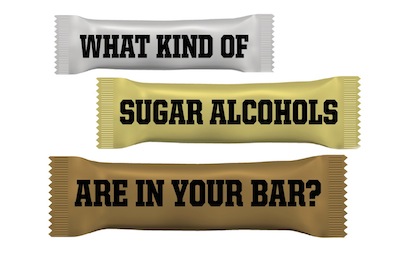Fitness Inventor


Sugar Alcohols in Protein Bars
Sugar Alcohols: Are These Low-Calorie Ingredients Good or Bad?
A group of ingredients that’s getting more and more common in the supplements we buy (and that I often get asked about) is a category of nutrients called “sugar alcohols.” The reason for their popularity is that they have a number of unique characteristics when added to food that meet the demands of both manufacturers and consumers.
Sugar alcohols are a group of sweeteners that have a similar structure to sugar and alcohol but aren’t actually either. They are “polyols” and are found naturally in many fruits and vegetables. They appear in various foods, including gums, mints, and other snacks and sweets. Most relevant to supplement users is that they are used in most protein bars. If you look at the labels of most of these bars, they will contain maltitol (or perhaps one or more of the other sugar alcohols). The advantage of using these sweeteners is that they have far fewer calories than sugar, they don’t increase insulin levels nearly as much as sugar, and they’re sweet and give the bar a nice, soft, chewy texture. The disadvantage is that they can cause bloating and diarrhea in some people if eaten in excessive amounts.
Over the years, sugar alcohols have received both positive and negative attention, but overall, my opinion is that the advantages do seem to outweigh the negatives. So here’s the deal: If you’re watching your weight by lowering your carb and calorie intake, increasing protein, and trying to keep your insulin levels from fluctuating and you like the taste and convenience of protein bars, then sugar alcohols are quite useful. Some of them are extremely tasty when added in just the right amount and replace a similar amount of sugar that you would otherwise have to eat to get the same level of sweetness. When it comes to which products with sugar alcohol are best, I would advise that you get advice from your friends at the gym who have tried them, and if you shop around a bit and taste test a few, you’ll likely find one or more that you really enjoy. However, some people are more sensitive to the unique taste of sugar alcohols and may not have as much luck.

Either way, remember, different bars have different amounts of the various sugar alcohols, and different people can handle different amounts of these ingredients. So it’s possible that the bar you choose may have an amount or type of sugar alcohol that doesn’t agree with you. If this is the case, stick to bars that have little or none of the following ingredients: maltitol, mannitol, sorbitol, xylitol, lactitol, and isomalt. You can get a good idea of how much of an ingredient is in a food or supplement by looking at the ingredient list. Ingredients are listed in the order of prominence in the product, so the first ingredient is the main ingredient in the product and the ingredient that exists in the smallest amount in the product is listed last.
Here’s an Overview of the Different Sugar Alcohols
- Mannitol (1.6 calories per gram) is extracted from seaweed and has 50 to 70 percent of the sweetness of sugar.
- Sorbitol (2.6 calories per gram) is made from corn syrup and has only 50 percent of the sweetness of sugar.
- Xylitol (2.4 calories per gram) is known as wood sugar and has the same sweetness as sugar. It is often found in chewing gums and has been shown to guard the teeth against cavities.
- Lactitol (2.0 calories per gram) has about 30 to 40 percent of the sweetness of sugar.
- Isomalt (2.0 calories per gram) is 45 to 65 percent as sweet as sugar and is used in hard candy.
- Maltitol (2.6 calories per gram) is 75 percent as sweet as sugar and is the most common sugar alcohol in protein bars mainly because it gives a creamy texture along with all of the other advantages.
- Erythritol (virtually zero calories per gram) has 70 percent of the sweetness of sugar.
For more information from The Fitness Inventor, click here!

